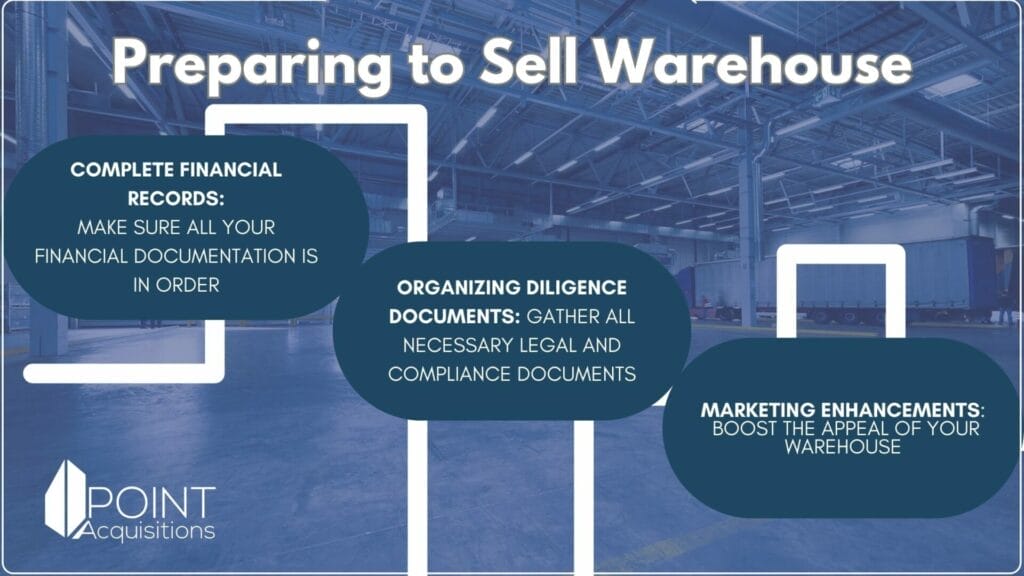
Selling A Warehouse: Every tip you will ever need
Selling a warehouse property is more than just a transaction; it’s a strategic move in the commercial real estate market. This decision can impact your financial portfolio significantly. Whether you’re a seasoned property owner or new to the scene, understanding the particulars of the selling market is crucial.
In this article, we dive into the various aspects to sell warehouse properties. We aim to equip you with knowledge and confidence whether you’re considering a sale now or in the future.

Table of Contents
Understanding the Warehouse Market
The warehouse market is a vital part of commercial real estate. It’s influenced by several factors that property owners and potential sellers should understand. The growing trend of online shopping and the evolving global supply chains have significantly increased the demand for warehouse spaces. This surge impacts both the availability and the pricing of these properties.
Technology also plays an important role in today’s commercial property market. Advanced tools enable real estate professionals to provide more accurate property valuations and market analysis. For sellers, staying updated with these technological advancements and market shifts is essential to succeed in warehouse property sales.
Key Factors Influencing the Warehouse Market:
- Location
- Property Values
- Unique Features
Location is very important, as it directly influences accessibility, logistics efficiency, and proximity to key markets, which are crucial for warehouse operations. Property values are equally important, reflecting the economic trends, demand-supply balance, and the income-generating potential of the warehouse. Lastly, unique features of a warehouse, such as high-tech facilities, ample storage space, or advanced security systems, significantly increase its market appeal.

Preparing to Sell Warehouse
When you decide to sell your warehouse, preparation is key. It’s not just about putting a “For Sale” sign up; it involves a series of steps to ensure your property is attractive to buyers and priced correctly.
Good preparation leads to a smoother sale process and a better selling price. This means understanding what buyers are looking for and making your warehouse meet those needs. It’s about presenting your warehouse as a space and an opportunity for the buyer.
Steps for Preparation:
- Complete Financial Records: Make sure all your financial documentation is in order. This includes income statements, balance sheets, and any other relevant financial information related to the warehouse. Clear financial records make it easier for potential buyers to understand the value of your investment.
- Organizing Diligence Documents: Gather all necessary legal and compliance documents. Documents may include property deeds, zoning compliance certificates, and environmental assessments. These documents prove the legality and compliance of your property.
- Marketing Enhancements: Boost the appeal of your warehouse. Consider minor repairs or cosmetic improvements to make the space more attractive. Also, consider how you’ll market the property – professional photos, virtual tours, and detailed property descriptions can make a significant difference.
By following these steps, you are making sure that your warehouse property is not just ready for sale but positioned attractively in the commercial real estate market. This preparation can be a deciding factor in how quickly and profitably you sell your warehouse.
Valuing Your Warehouse Property
Valuing your commercial property accurately is key to a successful sale. It’s a process that demands a deep understanding of the current commercial real estate market and the unique aspects of your property.
An accurate valuation helps set a realistic and competitive price, attracts serious buyers, and helps in a smoother negotiation process. It’s about finding the right balance between the market trends and the intrinsic value of your property.
Here are some components that should be considered when approaching the valuation stage:
Net Operating Income (NOI)
The property’s net operating income is a key metric in valuing commercial properties. It’s calculated by deducting operating expenses from the total income generated by the property. A higher NOI indicates a more valuable property, suggesting higher profitability.
Comparable Properties
Looking at comparable properties is essential. This involves examining recent sales of similar warehouses in your area. Please pay attention to their sale prices, sizes, features, and locations. This comparison gives you a realistic view of what buyers might be willing to pay for your property.
Market Dynamics
The real estate market is constantly changing, influenced by various economic factors. Understanding these dynamics – like supply and demand, economic growth, or industry trends – helps you gauge how these factors might affect your warehouse’s value.
By carefully evaluating these aspects, you can determine a fair and attractive price for your warehouse property. This positions your property favorably in the market and maximizes your potential returns from the sale.

The Brokerage Process in Commercial Real Estate
Commercial real estate brokers play a clear role in property transactions. They are licensed professionals who specialize in smoothing the buying and selling of commercial properties. Their responsibilities include:
- Market Analysis: Brokers analyze market trends, assess property values, and provide insights on the optimal transaction timing.
- Property Listing and Marketing: They list properties, develop marketing materials, and utilize their networks to reach potential buyers.
- Negotiation: Brokers negotiate terms and prices on behalf of their clients, aiming to secure the best possible deal.
- Documentation and Compliance: They handle necessary paperwork, follow legal compliance, and guide clients through the complex processes involved in real estate transactions.
- Advisory Services: Offering advice based on market knowledge, financial analysis, and their understanding of a client’s needs and goals.
While a commercial broker offers these expert services, some property owners may prefer direct sales methods or specialized companies focusing on simplified, direct transactions as an alternative to traditional brokerage.
FSBO (For Sale By Owner) vs Broker-Assisted Sales
FSBO Sales:
In For Sale By Owner (FSBO) transactions, the property owner handles the sale process without engaging a real estate broker.
Pros:
- Cost Savings: Owners save on broker commissions, which can be a significant amount.
- Direct Control: Owners have complete control over the sale process, including pricing, marketing, and negotiations.
Cons:
- Market Access: Limited access to the larger market and professional networks that brokers provide.
- Complexities: Handling negotiations, legal paperwork, and compliance can be challenging without professional expertise.
Broker-Assisted Sales:
Broker-assisted sales involve a commercial real estate broker who manages the sales process.
Pros:
- Expertise: Brokers bring market knowledge, negotiation skills, and legal know-how.
- Convenience: They handle the complexities of the sale, including paperwork, marketing, and negotiations.
Cons:
- Cost: Brokerage fees can be a significant expense.
- Less Control: Owners may have less direct control over the sale process.
While FSBO offers cost savings and control, it requires substantial effort and knowledge from the owner. On the other hand, broker-assisted sales provide expertise and convenience but at a cost. Property owners must weigh these factors based on their circumstances and preferences.
Let’s look at another option.

Point Acquisitions – Why You Can Trust Us
Point Acquisitions stands out in the field of commercial real estate. Our unique approach to warehouse property sales sets us apart from traditional commercial real estate professionals. Here are 6 excellent reasons why you can trust and choose Point Acquisitions for your warehouse sales:
- Expertise in Commercial Properties: With a collective experience of over 40 years, Point Acquisitions has become an authority in commercial property transactions. We offer deep market knowledge and customized strategies.
- Tailored Sales Process: We specialize in meeting the specific needs of property owners, tailoring a sales process that matches the owner’s terms and timeline.
- Transparency and Integrity: Our company’s commitment to honesty and clear communication in every transaction creates trust and long-lasting client relationships.
- Efficient and Streamlined Services: Point Acquisitions remove the complexities typically associated with closed property sales, making the process smoother and more efficient for property owners.
- Guaranteed Offer Timeliness: Unlike traditional brokers who may control a listing for an extended period, Point Acquisitions guarantees to provide a no-obligation offer within 48-72 hours after receiving information requests, eliminating the uncertainty often associated with sales price and timeline
Choosing Point Acquisitions means partnering with a team that understands the particulars of warehouse properties. We are dedicated to achieving the best possible outcomes for our clients.
Marketing Your Warehouse: Insights from Point Acquisitions
Point Acquisitions, known for our commercial real estate market expertise, is happy to share some key marketing tips for selling warehouse properties.
Effective marketing is important when attracting the right buyers and achieving the best sale outcome. It’s not just about listing the property but strategically positioning it in the market to highlight its best features.
Effective Marketing Strategies:
- Targeted Advertising: Use online and offline advertising platforms to reach potential buyers. Online platforms include commercial property listing sites, social media, and digital ads, while offline channels involve industry magazines and local business networks.
- Targeting the Right Buyers: Understand the profile of potential buyers for your warehouse space. Are they looking for storage solutions, distribution centers, or something else? Personalized marketing to the right audience significantly increases interest.
- Highlighting Property Highlights: Emphasize the unique features of your warehouse property. This could include the location, size, loading facilities, technology integrations, or recent upgrades. High-quality photographs and virtual tours also add immense value by giving potential buyers a detailed view of the property.
By adopting these strategies, you effectively market your warehouse, guaranteeing it stands out in the commercial real estate market. Point Acquisitions emphasizes that a well-thought-out marketing approach greatly influences the success of your property sale.
Negotiating the Sale
Negotiation is a critical phase in the sale of a warehouse property. It’s where the skills of understanding, communication, and compromise come into play.
Effective negotiation is not just about getting the highest price; it’s also about understanding the terms important to both the seller and the buyer. This stage requires a strategic approach, where knowledge of the commercial real estate market, legal aspects, and financial implications play a significant role.
The goal is to reach an agreement that satisfies all parties involved, pushing for a smooth transition and a successful sale.
Key Considerations in Negotiation:
Contract Terms
The terms of the real estate contract are the backbone of the negotiation. This includes the sale price, deposit amounts, contingencies, and any conditions related to the property, such as repairs or modifications. Reviewing these terms carefully is important to ensure they align with your objectives.
Fees and Commissions
Understand all the fees involved in the transaction, including any broker commissions, if applicable. These costs can impact the net proceeds from the sale, so it’s crucial to negotiate favorable yet realistic terms.
Closing Process
The closing process involves finalizing the sale and transferring ownership. Key aspects include:
- Setting a realistic closing date.
- Ensuring all necessary documents are prepared.
- Understanding the responsibilities of each party.
This stage also involves settling any outstanding issues and complying with legal requirements.

Legal and Financial Considerations
Complying with the legal and financial aspects is an important part of selling a warehouse property. This stage involves a detailed understanding of the legalities associated with property transactions and the following financial implications.
Handling these elements with diligence creates a smooth and legally compliant sale process. Sellers need to be aware of their legal responsibilities and the financial outcomes of the sale. This not only helps avoid potential legal issues but also maximizes financial returns.
Whether it’s understanding the tax liabilities or maintaining proper documentation, attention to detail in these areas significantly impacts the overall success of the sale.
Key Legal and Financial Aspects
Legal Liabilities
Sellers must know of any legal liabilities associated with their property, such as zoning laws, environmental regulations, or existing litigations. Complying with these legal requirements is important to avoid future disputes or penalties.
Tax Implications
The sale of a commercial property has significant tax implications. It’s important to understand how capital gains tax, property taxes, and any other relevant taxes will affect the net proceeds from the sale.
Escrow Agents
An escrow agent plays a key role in managing the funds and documents related to the property sale. They make sure that all conditions of the sale are met before the property and funds are exchanged, providing a layer of security and trust to the transaction process.

After the Sale: Post-Sale Responsibilities
After successfully dealing with the complexities of the warehouse market, preparing the property for sale, accurately valuing it, engaging in strategic marketing, and skillfully negotiating the deal, the sale of your warehouse property is complete.
However, the journey doesn’t end there. There are several crucial steps and responsibilities that follow the sale, which are essential for a smooth transition and to guarantee all legal and financial aspects are properly addressed.
Post-Sale Responsibilities:
- Ownership Transfer: The most immediate step is the formal transfer of ownership. This involves ensuring all legal documents are correctly filed and recorded. This process legally transfers the property to the buyer and is crucial for the official closure of the sale.
- Reinvestment Opportunities: After the sale, it’s important to consider the reinvestment of proceeds. Whether investing in other commercial properties, diversifying your portfolio, or other financial planning strategies, careful consideration of reinvestment can maximize the long-term benefits of your sale.
- Handling Business Contracts: If there are any ongoing business contracts related to the warehouse (such as leases, service agreements, or maintenance contracts), these need to be addressed. This might involve transferring these contracts to the new owner or terminating them as per the agreed terms.
The post-sale phase is as critical as the selling process itself. It means that all legalities are completed, financial aspects are settled, and any ongoing obligations are appropriately managed.
Conclusion
In conclusion, selling a warehouse property involves many steps and considerations. From understanding the specifics of the warehouse market and preparing the property for sale to valuing it accurately, each phase plays a vital role in the transaction’s success.
The process demands attention to marketing strategies, effective negotiation tactics, and a thorough understanding of legal and financial responsibilities. Post-sale, the focus shifts to ownership transfer, reinvestment strategies, and managing ongoing business contracts.
While this process can seem daunting, especially given the complexities and various aspects to juggle, it doesn’t have to be so challenging. This is where Point Acquisitions offers a significant advantage. By working with Point Acquisitions, you gain a partner who simplifies and streamlines the entire process.
Our expertise, personalized approach, and commitment to transparency and efficiency will transform your experience selling your warehouse property.
Frequently Asked Questions
What should I consider when selling my investment property?
When selling an investment property like a warehouse, it’s important to consider factors like the current market conditions, the income-generating potential of the property, and your financial goals. Making sure you have complete financial records ready will also help in accurately valuing the property and attracting serious buyers.
Are there any specific documents I must prepare or sign as a seller, not the buyer?
As a seller, you must prepare and sign various loan documents. These include the transfer deed, disclosure forms, and any other documents your state requires for property sales. Understanding these documents is important, especially since you are not the buyer and the responsibilities differ.
How do I determine if my warehouse is an income generating property?
Income generating properties produce a steady revenue stream, typically through leases or rentals. For a warehouse, this can be assessed by reviewing the current lease agreements, occupancy rates, and the historical income data of the property. Having complete financial records ready can help in this assessment.
What key financial records must I have ready when selling my commercial property?
Complete financial records ready for sale include profit and loss statements, balance sheets, tax returns, lease agreements, and maintenance records. These documents provide a clear picture of your property’s financial health and performance, which is crucial for potential buyers.
Is there anything I should know when signing loan documents prepared by a buyer or a financial institution?
When you sign loan documents prepared by a buyer or a financial institution, thoroughly reviewing all the terms and conditions is important. Make sure you understand the implications of every clause, particularly those related to payment terms, interest rates, and your obligations as the seller.
About The Author

Jesse Shemesh
Disclaimer
Please note that Point Acquisitions is not a tax expert or tax advisor. The information on our blogs and pages is for general informational purposes only and should not be relied upon as legal, tax, or accounting advice. Any information provided does not constitute professional advice or create an attorney-client or any other professional relationship. We recommend that you consult with your tax advisor or seek professional advice before making any decisions based on the information provided on our blogs and pages. Point Acquisitions is not responsible for any actions taken based on the information provided on our blogs and pages.
1031 Exchange Capital Gains Tax Deferral
According to a 2021 report by the National Real Estate Exchange Services (RES), over 240,000 1031 exchange transactions were completed in the United States, totaling $100 billion. This impressive figure underscores the role of 1031 exchanges in the real estate…
Read More1031 Exchange Benefits
As of Q4 2023, the national vacancy rate for all commercial property types in the United States sat at 9.2%, according to CBRE’s latest insights and research. This represents a slight decrease compared to the previous quarter and suggests a…
Read More1031 Exchange Legal Considerations: A Must-Read Guide
You’re in the right place if you’re considering a 1031 exchange for your commercial real estate investments. Whether you’re a seasoned investor or just dipping your toes into the market, understanding the legal landscape of 1031 exchanges is key to…
Read More

